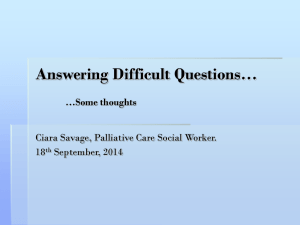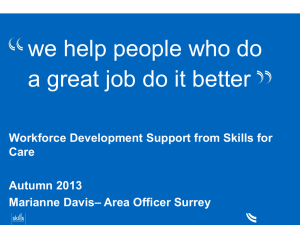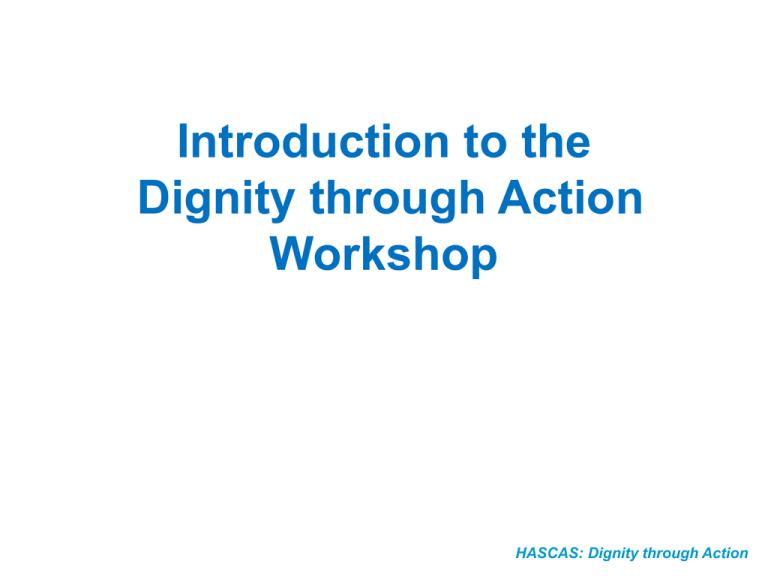
Introduction to the
Dignity through Action
Workshop
HASCAS: Dignity through Action
BACKGROUND TO
DIGNITY THROUGH ACTION
To encourage improved care delivery, in relation to ‘Dignity’,
to older people in a variety of care situations.
In summary the goals of this work are to:
Challenge values, beliefs and attitudes
Provide an educational approach through a resources
package for qualified and unqualified healthcare workers.
Deliver a positive action orientated programme as the
basis for sustainable changes in the work place.
HASCAS: Dignity through Action
DIGNITY THROUGH ACTION (OLDER PEOPLE) RESOURCES
Resource 1
Dignity through Action
Facilitators’ Handbook
Resource 2
Resource 3
Resource 4
Resource 5
Dignity Study Guide
Dignity through Action
Workshop Pack
Organizations’ Guide
To
Dignity through Action
Older Peoples’
Guide to Dignity
Key Questions & Key Actions
HASCAS: Dignity through Action
Timetable
Work Type
Topic
Presentation and
Case Study Activity
Presentation and
Case Study Activity
Introduction to the Dignity Workshop
The Meanings of Dignity
Presentation
Action Planning
Presentation
Action Planning - Worked Example
Activity
Producing a Personal Action Plan
Dignity Challenges
HASCAS: Dignity through Action
DIGNITY THROUGH ACTION WORKSHOP
PART 1
The Meanings of Dignity
HASCAS: Dignity through Action
The Meanings of Dignity
‘Dignity’ is a term which is used in two major ways.
1. Dignity is a quality of the way we treat others as human
beings.
2. Dignity is quality of an older person’s ‘inner self’.
Personal dignity and self image (self-esteem/self-respect)
Expectations of being treated with dignity
Appearing dignified (looking and acting dignified)
HASCAS: Dignity through Action
Meaning of Respect
‘Respect’ is a term which is intimately related to ‘dignity’
‘Respect’ is a verb (action or doing word).
Rights
Freedoms
Culture
Habits
Respect
for
Modesty
Values
Capability
Personal
Space
HASCAS: Dignity through Action
Types of Dignity
Treating Older
People as
Human Beings
Meeting Older Peoples’ Human Needs
Need for
Personal Identity
Need for
Merits
to be recognised
Need for
Moral Status
to be recognised
HASCAS: Dignity through Action
Treating People as Human Beings 1
UK Law
Universal
Declaration of
Human Rights
European
Convention on
Human Rights
Human Rights
Act
(UDHR 1948)
(ECHR 1950)
(HRA 1998)
‘all human beings, endowed with reason and conscience . . . are born free and equal in
dignity and rights . . . and should act towards one another in a spirit of brotherhood . . .
and to be protected against the random misfortunes of life whatever their origins’.
Underpinning values:
• Life and freedom from abuse.
• Justice.
• Privacy.
• Freedoms (thought, conscience, religion, expression, association).
• Prohibition of discrimination.
HASCAS: Dignity through Action
Treating People as Human Beings 2
UK Human Rights Act (1998)
Article 2
Article 3
Right to life
Prohibition of torture (Abuse)
Article 4
Prohibition of slavery and forced labour
Article 5
Right to liberty and security
Article 6
Right to a fair trial
Article 7
No punishment without law
Article 8
Article 9
Article 10
Article 11
Right to respect for private and family life
Freedom of thought, conscience and religion
Freedom of expression
Freedom of assembly and association
Article 12
Right to marry
Article 14
Prohibition of discrimination
Article 16
Restrictions on political activity of aliens
Article 17
Prohibition of abuse of rights (unless objective reasons)
Article 18
Limitation on use of restrictions on rights
Protocol 1
Protection of property
Protocol
Right to education
Protocol
Right to free elections
Protocol
Abolition of the death penalty
HASCAS: Dignity through Action
Treating People as Human Beings 3 – Some Examples
Some Examples of Possible Breeches
Article 2
Right to life
No proper assessment of needs
Article 3
Prohibition of torture (Abuse)
or degrading treatment
Not being given enough fluids
Article 5
Right to liberty and security
Older people in care homes given sedatives,
tranquillisers and restrained physically
Article 8
Right to respect for private and family life
Going through someones belongings without
permission
Article 9
Freedom of thought, conscience and religion
Restricting access to place of worship
Article 10
Freedom of expression
Frightened to complain
Article 11
Freedom of assembly and association
Article 14
Prohibition of discrimination
Access to health services or age related rationed
healthcare
Protocol
Protection of property
Disposal of personal property
HASCAS: Dignity through Action
Treating People as Human Beings 3A – Further Examples
Article 2: Right to Life
Some older people go into long-term care without receiving a comprehensive assessment
of their needs.
Older people with certain conditions may be left untreated until crises arise, as it is
perceived that they are in a place of safety.
Reversible mental health conditions such as depression are not diagnosed and are not
treated.
Nearly half of care homes are failing to meet national minimum standards for how they give
persons their medication, prescribed by their doctors, to treat their medical conditions.
Geriatrics Society (2007)
HASCAS: Dignity through Action
Treating People as Human Beings 3B – Further Examples
Article 2: Right to Life (Neglect - Wide ranging term).
(Help the Aged (2007)). Not enough given fluids, food, clothing or personal care (necessities for daily living).
Neglect could include not being changed out of dirty or wet clothes, not being given the right medication or
not being given enough time to eat a full meal
(Age Concern (2006))
60% of older people at risk of malnutrition (or situation getting worse).
40% of older people are malnourished on admission to hospital
Patients over 80 yrs admitted to hospital have 5 time prevalence of malnutrition than those less than 50 yrs
Malnourished people stay in hospital longer and are 3 times more likely to develop complications and
infections.
50% of older people in general hospitals have mental health needs.
Cost of malnutrition on health care costs is £7.4bn pa (more than obesity). Half of this cost is spent on
people over 60 yrs.
Of those who said they needed help to eat their food, 18% said they got no help and 21% said help was only
given sometimes.
HASCAS: Dignity through Action
Treating People as Human Beings 3C – Further Examples
Article 3: Prohibition of torture (Abuse)
500,000 older people are believed to be abused at any one time in the UK (Ogg and
Bennett 1992 on behalf of the Royal London Trust)
Two thirds of abuse is committed at home by someone in a position of trust
and
Those aged between 80 and 89 are the most vulnerable to abuse
(Based on analysis of calls to the Action on Elder Abuse helpline)
Older persons can be given the wrong medication, someone else’s medication, medication
in the wrong doses or no medication at all (Geriatrics Society (2007)
HASCAS: Dignity through Action
Treating People as Human Beings 3D – Further Examples
Article 5: Right to liberty and security
Older people in care homes may be given sedatives, tranquillisers and restrained physically.
This can arise as a result of inadequate levels of staff, skills and training
(Geriatrics Society, (2007))
Article 8: Right to respect for private and family life
Theft. Items of value that are stolen such as money or jewellery. It can insignificant to an
outsider, but valuable to an older person. Theft can also be where people in position of trust
use money or possessions in ways that the owner is ie not happy with or keep it for
themselves (Help the Aged (2007))
Article 14: Prohibition of discrimination
Availability of resources
Resuscitation issues
Access to services
Health service rationing
Age related targets
HASCAS: Dignity through Action
Treating as Human Beings People – Supporting Laws
Other UK Laws uphold (older) people’s rights and direct how people
should be treated by others:
Q. WHAT ARE THESE UK LAWS?
HASCAS: Dignity through Action
Treating People as Human Beings – Supporting Laws
Other UK Laws uphold (older) people’s rights and direct how people
should be treated by others – for example:
•
•
•
•
•
•
•
•
•
•
•
•
•
•
Sex Discrimination Act (1975).
Race Relations Act (1976).
Data Protection Act (1998).
Sexual Offences Act (2003).
Discrimination Acts (1995) & (2005).
Race Relations Act (2000).
Freedom of Information Act (2000).
Employment Equality (Sexual Orientation) Regulations (2003).
Employment Equality (Religion or Belief) Regulations (2003).
Mental Capacity Act (2005).
Safeguarding Vulnerable Groups Act (2006).
Employment Equality (Age) Regulations 2006.
Mental Health Act 2007.
Health and Social Care Act 2008
HASCAS: Dignity through Action
Types of Dignity
Dignity of the
Human Being
· Conventions and
Laws
· Right to Life
· No Abuse
· Justice
· Privacy
· No discrimination
· Freedoms/Respect
Conscience
Religion
Expression
Association
HASCAS: Dignity through Action
Types of Dignity
Treating Older
People as
Human Beings
Meeting Older Peoples’ Human Needs
Need for
Personal Identity
Need for
Merits
to be recognised
Need for
Moral Status
to be recognised
HASCAS: Dignity through Action
Older Peoples’ Personal Needs
Maslow’s
Hierarchy of
Needs
SELF-ACTUALIZATION NEEDS
Creativity, problem solving,
morality, PERSONAL IDENTITY
ESTEEM NEEDS
SELF-ESTEEM, SELF-RESPECT,
RESPECT OF OTHERS
LOVE & BELONGING NEEDS
Family and Friendship
SAFETY NEEDS
Security of: health, family, property, beliefs & employment etc
PHYSIOLOGICAL NEEDS
Air, Water, Food, Sleep, System Equilibrium, Excretion, Sex .
HASCAS: Dignity through Action
Types of Dignity
Dignity of the
Human Being
· Conventions and
Laws
· Right to Life
· No Abuse
· Justice
· Privacy
· No discrimination
· Freedoms/Respect
Conscience
Religion
Expression
Association
Dignity of
Personal
Identity
·
·
·
·
·
Personal Identity
Self Respect
Self-esteem
Resilience
Personal
Relationships
HASCAS: Dignity through Action
Types of Dignity
Dignity of the
Human Being
· Conventions and
Laws
· Right to Life
· No Abuse
· Justice
· Privacy
· No discrimination
· Freedoms/Respect
Conscience
Religion
Expression
Association
Dignity of
Personal
Identity
·
·
·
·
·
Personal Identity
Self Respect
Self-esteem
Resilience
Personal
Relationships
Dignity of
Merit
·
·
·
·
·
·
·
·
·
·
·
Achievements
Rank and Seniority
Place in Society
Honours awarded
Employment
Knowledge & Skills
Experience
Qualifications
Financial Worth
Success in Life
Independence
HASCAS: Dignity through Action
Types of Dignity
Dignity of the
Human Being
· Conventions and
Laws
· Right to Life
· No Abuse
· Justice
· Privacy
· No discrimination
· Freedoms/Respect
Conscience
Religion
Expression
Association
Dignity of
Personal
Identity
·
·
·
·
·
Personal Identity
Self Respect
Self-esteem
Resilience
Personal
Relationships
Dignity of
Merit
·
·
·
·
·
·
·
·
·
·
·
Achievements
Rank and Seniority
Place in Society
Honours awarded
Employment
Knowledge & Skills
Experience
Qualifications
Financial Worth
Success in Life
Independence
Dignity of
Moral Status
· Peoples’ Moral
Principles
· Religious Faith
· Community
Membership
· Leadership
· Recognised roles
HASCAS: Dignity through Action
Types of Dignity
Dignity of the
Human Being
· Conventions and
Laws
· Right to Life
· No Abuse
· Justice
· Privacy
· No discrimination
· Freedoms/Respect
Conscience
Religion
Expression
Association
Dignity of
Personal
Identity
·
·
·
·
·
Personal Identity
Self Respect
Self-esteem
Resilience
Personal
Relationships
Dignity of
Merit
·
·
·
·
·
·
·
·
·
·
·
Achievements
Rank and Seniority
Place in Society
Honours awarded
Employment
Knowledge & Skills
Experience
Qualifications
Financial Worth
Success in Life
Independence
Dignity of
Moral Status
· Peoples’ Moral
Principles
· Religious Faith
· Community
Membership
· Leadership
· Recognised roles
HASCAS: Dignity through Action
Types of Dignity
Older Person as a
Human Being
Dignity of the
Human Being
Older Person’s Human Needs
Need for
Personal Identity
Need for
Merits
to be recognised
Need for
Moral Status
to be recognised
Dignity of
Personal
Identity
Dignity of
Merit
Dignity of
Moral Status
The Dignity and Older Europeans (DOE) Project Study 2001-2004
University of Cardiff
HASCAS: Dignity through Action
Activity 1
The Aged War Hero
HASCAS: Dignity through Action
DIGNITY CASE STUDY A: TYPES OF DIGNITY
ACTIVITY 1
See the real newspaper article opposite taken from the
Daily Telegraph. You see stories like this in the media
and they can be upsetting.
This exercise requires you to take a step back from the
emotions and think about how this man was treated.
There are 4 types of dignity:
Dignity of the Human Being.
Dignity of Personal Identity.
Dignity of Merit.
Dignity of Moral Status.
From this real life case study find one or
more examples where each type of
dignity has been affected.
You should put your notes onto the
Activity 1 Worksheet.
Do not become distracted by speculating
about possible details which have not
been reported.
Hospital ‘degraded’ hero then sent him home to die
101-YEAR-OLD WAR VETERAN PUT IN A TAXI WITH A BAG FULL OF SOILED
CLOTHING
By John Bingham
A war hero aged 101 was sent home to die by a hospital
while wearing only a nappy and a set of ill fitting
pyjamas.
The family of Brigadier XXXXX, who won the
Distinguished Service Order, for his leadership in one of
the fiercest battles of the Italian Campaign in the Second
World War, said he was discharged when unable to feed
himself and clutching a bag of soiled clothing.
The Brigadier’s daughter-in law, Amanda, said his case
highlighted a “disgraceful” lack of care. “All that he had
at the end of his 101 years was his dignity and they took
that away from him,” she said.
In May 1944, Brigadier XXXXX, then a Lieutenant
Colonel, led men of the 2 nd Battalion, the Somerset Light
Infantry, in the assault across the Garigliano River. He
was wounded twice during the operation and later
received the Distinguished Service Order for bravery.
They said he was in a confused state and incontinent
after a stay which left him “degraded and humiliated”.
During his five-day spell in a mixed-sex observation
ward at in XXXXXXXXX District Hospital, his hearing
aid was crushed, his false teeth went missing and soiled
pyjamas were piled up unwashed in a locker by his
bedside.
“They packed him off in the back of a taxi, with
somebody else’s pyjamas on and a nappy so tight that he
could hardly breathe and two cotton blankets on his
shoulders,” said his daughter-in-law. “They had lost his
false teeth ... and somebody had stood on his deaf aid,
which was crushed.”
Knowing he was dying after losing his ability to swallow
food, he asked to go home. But no ambulance was
available so he was sent in a taxi on an hour-long journey
to a care home where he died a few days later.
She added: “I just can’t believe that any hospital would
keep excrement-covered clothing in a locker for five
days. I got the impression this lack of attention must be
endemic because it was so lightly treated.”
When his family complained about the hygiene issues
involving the pyjamas, the hospital wrote back to say that
it was unfortunate that he had been unable to avail
himself’ of its laundry service. It has since apologised to
Brigadier John’s family for the “unacceptable” nature of
his discharge in late 2006.
In a statement, the hospital said: “Some aspects of
Brigadier XXXXX’s discharge from hospital in 2006
were unacceptable and the trust apologise for any distress
that this has caused.
His case came to light as Nial Dickson, chief executive
of the King’s Fund, warned of a deterioration of
compassion among staff in NHS hospitals.
Daily Telegraph
Wednesday 31st December, 2008
Just keep to the ‘big picture’.
HASCAS: Dignity through Action
Activity 1
There is a
worksheet in the
Workshop Pack
As a reminder
there is a
copy of the
types of
dignity slide.
HASCAS: Dignity through Action
Activity 1
The Aged War Hero
HASCAS: Dignity through Action
Activity 1: The Meanings of Dignity (Some Ideas)
Dignity of the Human Being.
Private property
Loss of and damage
Dignity of Personal Identity
Self-esteem
Failing body Confusion/incontinence. frustration
Humiliation – clothing
Neglect ?
Hygiene issues
Eating
Mixed sex ward issue
Going home – choices?
Ageism ?
Assessment issues
Dying with dignity
Need for respectful
treatment.
Dignity of Merit
Dignity of Moral Status
Senior Army Officer He was responsible
decorated in war.
for the lives and
welfare of many
Served country – his hundreds of people.
expectations to be
treated with some
Honoured and
dignity that reflects respected by the
his rank status,
people he would have
previous
been in charge of.
achievements and
contribution to
Leader
society.
Expectations of being
worthy of respect
for his contribution.
HASCAS: Dignity through Action
HASCAS: Dignity through Action

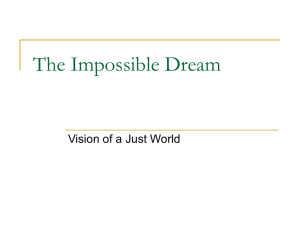
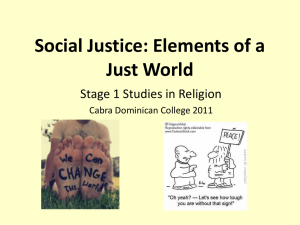
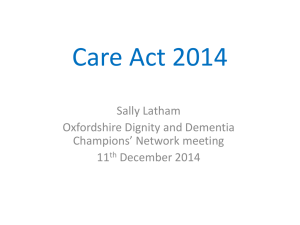
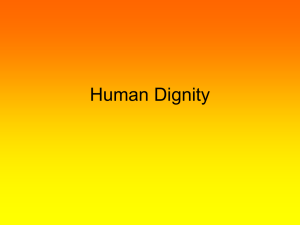

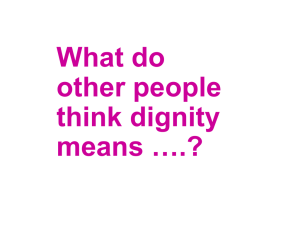
![4[1]._a_man_as_a_person](http://s2.studylib.net/store/data/005226893_1-b67b2be2c3623c1c44b6baa80b997c62-300x300.png)
